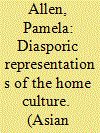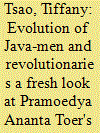| Srl | Item |
| 1 |
ID:
139457


|
|
|
|
|
| Summary/Abstract |
The focus of this paper is the ways in which certain customs and traditions are actively selected and/or reinvigorated and subsequently authorised, by institutions or by individuals, as being key markers of the culture of the ‘homeland’. The cultural practices chosen for discussion are the kejawen mystical system as practised in Suriname and the acquisition of the Indonesian national language, bahasa Indonesia, in New Caledonia. The discussion is informed by two key ideas. The first is that immigrant communities designate certain cultural practices as being worthy of preservation as an ‘inheritance’ for the future. The second is the interplay between cultural practices and power or authority, which gels in scholarly discussions about ‘cultural heritage’. I argue that the continuation of a cultural practice or tradition lies as much with its authorisation by key individuals or institutions as it does with its purported authenticity.
|
|
|
|
|
|
|
|
|
|
|
|
|
|
|
|
| 2 |
ID:
111522


|
|
|
|
|
| Publication |
2012.
|
| Summary/Abstract |
This article undertakes an in-depth exploration of the trope of human evolutionary development undergirding Pramoedya Ananta Toer's Buru Quartet - a trope that has hitherto received no detailed critical attention in Pramoedya scholarship. Drawing on the traditional Javanese values of Pramoedya's childhood and the Marxist ideological values of his early adulthood, the Quartet casts the individual's moral development from selfish individualism to selfless community-mindedness as the development from animalism to 'modern humanity'. In the context of traditional Javanese and Marxist cosmologies, such self-denial ends in victory: respectively, the accumulation of personal power and the successful revolutionary replacement of capitalism with socialism. However, during his brutal imprisonment in the Darwinian wilderness of Buru, Pramoedya experienced an environment that rewarded animalism and made it difficult for those ascribing to 'human' values to survive. Originally composed in Buru, the Quartet bears the mark of its origins and its author's disillusionment, portraying the attainment of Javanese and Marxist standards of humanity as a decision to defy the laws of natural selection and overcome one's instinct for self-preservation. By dissociating the acquisition of humanity from the acquisition of power, the Quartet produces modified versions of the Javanese and Marxist moral human development based not on the expectation of success and the will to live, but on the expectation of failure and the determination to die.
|
|
|
|
|
|
|
|
|
|
|
|
|
|
|
|